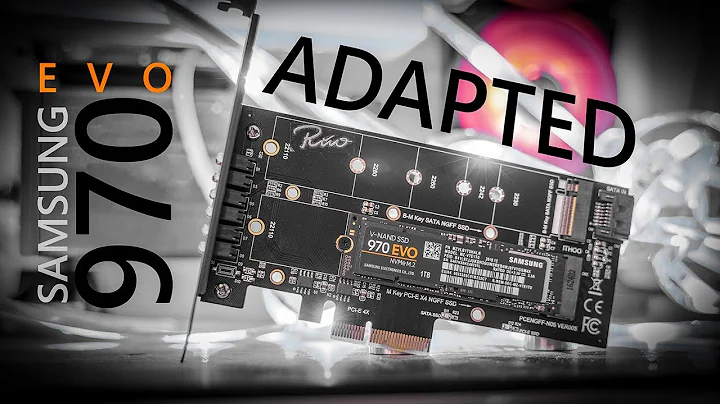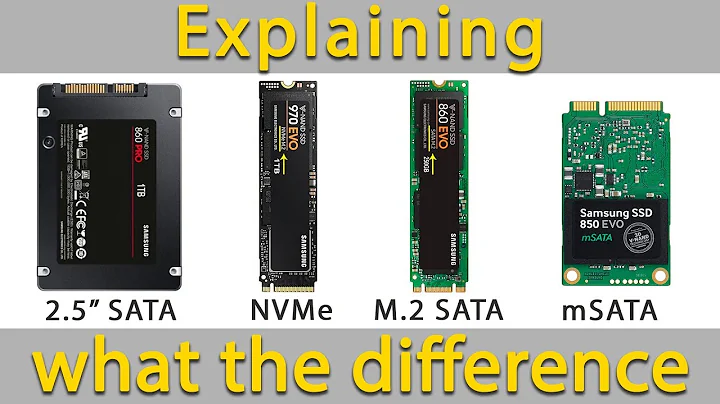Does any PCIe slot support NVMe SSD's automatically or do I need a specific M.2 slot?
All PCIe NVMe cards are PCI v3 (or later), although the PCI NVMe standard does allow for x1 connections the majority of M.2 are x4 connectors, in fact I'm not sure there's a physical connector defined for >x4 lanes, M.2 is a physical specification definition for a device capable of both SATA and PCI NVMe drives, some motherboards will not support NVMe at all, some will so to some extent and some explicitly support it - it depends on the system board specification, your BIOS needs to support it - just having UEFI does not ensure NVMe is supported, 'lower risk' than what exactly?
Also your statement about PCIe v3 working in any v2 slot is incorrect, I'm sure one or two may but that's the exception not the rule, the opposite is true though, v2 adapters will almost always work in v3 slots.
Related videos on Youtube
Abel
Creator of the .NET XSLT 3.0 processor Exselt, which is currently in beta. You can reach me via Twitter (sometimes), by mail at [email protected] (be careful not to look like spam), or through my companies Exselt or Abrasoft (consultancy). I'm an invited expert of the W3C XSLT and XQuery Working Group where we develop the next version of XSLT: version 3.0. Since September 2015 the group went public, which means that most of the mail discussions can now be actively participated in. If you find a bug or other issue with the XSLT 3.0 specification, you can send a mail to [email protected], or you can visit the archives (since Sept 2015).
Updated on September 18, 2022Comments
-
Abel over 1 year
I have been trying to dissect the information I find with googling, but have come to the conclusion that I cannot find with certainty the answer to the following questions:
Given you know the basics of your own desktop system, how do I know it supports NVMe drives?
- Does it require PCIe v2 or v3?
- Is a free x4 slot enough (if the spec of the drive says PCIe x4, for instance)?
- What does M.2 mean in this context (I have come to understand that it is an internal interface, and can connect with PCIe, mSATA or USB-3, depending on drive, is that correct?)
- Does the motherboard need to support NVMe (I think it does)? If it doesn't, can I still use the drive or is there an extension card?
- Does my BIOS need to support NVMe, or is "standard" UEFI BIOS enough?
- I read that the mean-time-to-failure is much higher (lower risk) with NVMe drives, is that because of NVMe, or because of the simple fact the more expensive drives have this and use better technology internally anyway?
I have come to understand from my previous question that any PCIe v3 device also fits in a PCIe v2 device, obviously with lower maximum speeds, is that also true for NVMe?
I know these are a bunch of questions and maybe I should've asked them one at a time, but I think they fit well together and may help others that struggle with understanding all the new techno buzz.
-
Abel over 7 yearsOn "lower risk", I meant that NVMe influences the MTBF (mean time between failures, or whatever term is used for durability), because it spreads the write actions better than with TRIM on AHCI. But I am not sure this is correct. More importantly, it seems you are saying NVMe drives will only work on motherboards that (fully and explicitly) support it. Is that what you meant (as opposed to "they work, but you don't have the NVMe benefits")? Thanks for answering all the other things as well so quickly.
-
Abel over 7 yearsOn PCIe v3 cards being backwards compatible on PCI v2 slots: I found numerous claims that say so, and the wikipedia article claims the same. I don't know if that info is correct, but you have gotten me curious (and more confused) for sure.
-
David Schwartz over 7 yearsTwo things: 1) Every v3 slot is also a v2 slot. Every v3 device is also a v2 device. The v3 standard is a superset of the v2 standard. If you don't comply with v2, you cannot comply with v3. 2) No BIOS or motherboard support is needed, just PCIe support. However, you may not be able to boot from the NVMe device.
-
 ewwhite over 7 yearsPCI 2.0 slots can accommodate NVMe cards. Never been an issue for me.
ewwhite over 7 yearsPCI 2.0 slots can accommodate NVMe cards. Never been an issue for me. -
Abel over 7 years@DavidSchwartz, that should probably be in the answer. ewwhite, thanks, that also answers the question :). Chopper3, perhaps your last para should be updated, given these comments?






